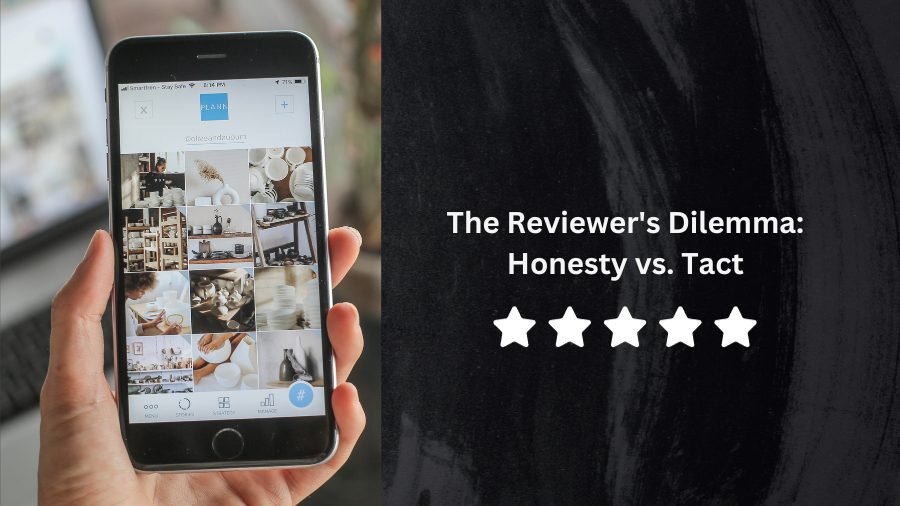Introduction
Online reviews have become a ubiquitous part of our consumer-driven world. Before making a purchase, dining at a restaurant, or choosing a service, we often turn to the internet to read what others have experienced. This reliance on reviews has elevated the role of reviewers to a position of great influence. However, with great power comes great responsibility, and reviewers are often faced with a challenging dilemma – how to balance honesty in their feedback with the need for tact and consideration.
The Power of Reviews
Reviews have the potential to make or break a business. Positive reviews can attract new customers and boost sales, while negative reviews can have a detrimental impact, leading to lost revenue and damaged reputations. This power that reviews hold underscores the importance of providing honest feedback.
The Importance of Honesty
Honesty is the cornerstone of a meaningful review. When a reviewer shares their genuine experience, it helps other consumers make informed decisions. Honesty builds trust and credibility within the reviewing community and ensures that businesses receive accurate feedback.
The Impact of Tact
While honesty is crucial, tact is equally important. Tact involves delivering honest feedback in a considerate and respectful manner. It recognizes that behind every product or service are hardworking individuals who may be deeply invested in their work. Tactful reviews can inspire positive change without causing unnecessary harm.
Balancing Act: Honesty with Sensitivity
Reviewers often face the challenge of striking the right balance between honesty and sensitivity. This requires careful consideration of the words used and the tone conveyed. A well-crafted review can be both candid and empathetic.
Constructive Criticism vs. Harsh Critique
One way to maintain this balance is by offering constructive criticism rather than harsh critique. Instead of simply pointing out flaws, provide suggestions for improvement. This approach encourages growth and fosters a spirit of improvement.
The Emotional Aspect
It’s important to acknowledge the emotional aspect of reviewing. Negative reviews can be emotionally charged, both for the reviewer and the business being reviewed. Reviewers should be mindful of the potential impact of their words on others.
The Ethics of Reviewing
Ethics play a pivotal role in the reviewer’s dilemma. It’s essential to be truthful, fair, and unbiased in reviews. Avoiding conflicts of interest and disclosing any potential biases is imperative.
Navigating Negative Reviews
Negative reviews are often the most challenging to handle. Reviewers can soften the blow by focusing on specific issues rather than making sweeping condemnations. Highlighting positives alongside negatives can provide a more balanced perspective.
Case Studies: Honesty Pays Off
Several case studies have demonstrated that honesty in reviews can lead to positive outcomes. Businesses that respond positively to criticism and make improvements often garner respect and loyalty from customers.
The Role of Language
The choice of words can significantly impact the tone of a review. Using polite and respectful language can go a long way in maintaining a sense of tact while being honest.
The Influence of Anonymity
Some reviewers choose to remain anonymous, which can lead to a lack of accountability. While anonymity has its benefits, it’s important for anonymous reviewers to remember their responsibility to be fair and honest.
Reviewer’s Responsibility
Reviewers must recognize the weight of their words. Their reviews can shape perceptions, impact livelihoods, and influence decisions. With this power comes a profound responsibility.
Conclusion
In the realm of online reviews, the reviewer’s dilemma persists – how to balance honesty with tact. While the power of honest reviews cannot be understated, delivering feedback with sensitivity and respect is equally crucial. Reviewers must remember that behind every review is a human experience, and their words can have a lasting impact.
FAQs
- Is it essential to leave a review for every experience?
- No, reviews should be left when you have a meaningful opinion or experience to share.
- How can I provide constructive criticism without sounding harsh?
- Focus on specific issues, offer suggestions for improvement, and maintain a respectful tone.
- Do businesses really pay attention to online reviews?
- Yes, many businesses take online reviews seriously and use them to make improvements.
- What should I do if a business responds negatively to my review?
- Stay polite and factual in your responses, and remember that others are watching.
- Is it ethical to write a negative review about a small, struggling business?
- It’s ethical to provide honest feedback, but do so constructively and avoid undue harm to the business.
Remember that as a reviewer, your words have the power to influence and shape perceptions. Use that power wisely, with honesty and tact, to contribute positively to the reviewing community.



